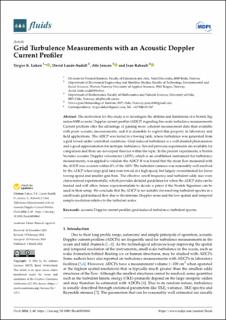Grid turbulence measurements with an acoustic Doppler current profiler
Peer reviewed, Journal article
Published version

View/
Date
2024Metadata
Show full item recordCollections
Original version
Løken, T. K., Lande-Sudall, D., Jensen, A. & Rabault, J. (2024). Grid turbulence measurements with an acoustic Doppler current profiler. Fluids, 9(3): 60. doi: 10.3390/fluids9030060Abstract
The motivation for this study is to investigate the abilities and limitations of a Nortek Signature1000 acoustic Doppler current profiler (ADCP) regarding fine-scale turbulence measurements. Current profilers offer the advantage of gaining more coherent measurement data than available with point acoustic measurements, and it is desirable to exploit this property in laboratory and field applications. The ADCP was tested in a towing tank, where turbulence was generated from a grid towed under controlled conditions. Grid-induced turbulence is a well-studied phenomenon and a good approximation for isotropic turbulence. Several previous experiments are available for comparison and there are developed theories within the topic. In the present experiments, a Nortek Vectrino acoustic Doppler velocimeter (ADV), which is an established instrument for turbulence measurements, was applied to validate the ADCP. It was found that the mean flow measured with the ADCP was accurate within 4% of the ADV. The turbulent variance was reasonably well resolved by the ADCP when large grid bars were towed at a high speed, but largely overestimated for lower towing speed and smaller grid bars. The effective cutoff frequency and turbulent eddy size were characterized experimentally, which provides detailed guidelines for when the ADCP data can be trusted and will allow future experimentalists to decide a priori if the Nortek Signature can be used in their setup. We conclude that the ADCP is not suitable for resolving turbulent spectra in a small-scale grid-induced flow due to the intrinsic Doppler noise and the low spatial and temporal sample resolution relative to the turbulent scales.
